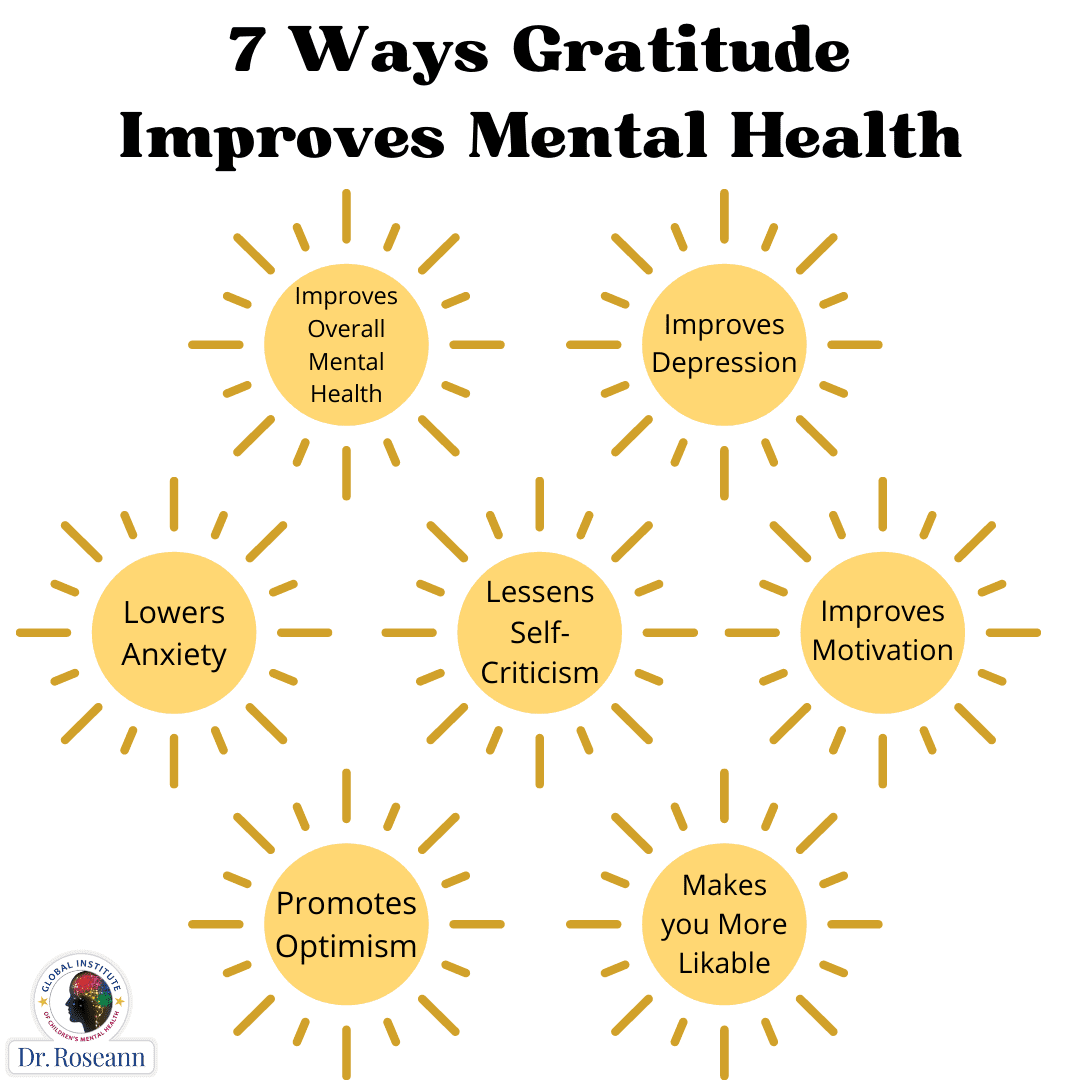We all know gratefulness makes us feel good and makes others feel good too but there is actually a lot of science behind gratitude. The neuroscience of gratitude shows us that it improves how our brain works, which brings us feelings of wellness and has physical benefits too.
Gratefulness improves anxiety and depression and from studies from positive psychology, there are many ways it can help our physical and mental health, as well as protect us from stress.
Gratitude Improves Overall Mental Health
Appreciation has long been associated with positive feelings that improve physical and mental health. When a person is glass half full, they just see the world differently and don’t experience stress in the same way as a person who is more negative. Gratefulness is a counter to daily stress that can build over time and have a toxic effect on a person’s health.
Gratitude Improves Depression
It may not only protect you from depression, but may also counteract the symptoms by enhancing a state of peace of mind and reducing ruminative thinking. Feelings of appreciation produce positive emotions and serve to counter negative experiences and the toxic emotions that may surround you.
Gratitude Lowers Anxiety
One study showed that adolescents who practiced thankfulness were less likely to have anxiety and depression. The practice of gratitude gave them more coping flexibility in handling stress. Appreciation practices gave them the cognitive flexibility to use coping skills and problem solve instead of feeling sad and hopeless.
Gratitude Lessens Self-Criticism
When you are depressed or anxious, it is really easy to fall into a pattern of self-criticism. Research has found that gratitude is connected to a less critical, less punishing, and more compassionate relationship with the self. Whether you are writing a gratitude mantra to live by or write in your journal, saying positive affirmations are an important part of embracing the practice.
Gratitude Improves Motivation
When you are depressed or anxious, the last thing you feel is motivation. Research shows us that gratefulness practices improve emotional self-regulation, which improves motivation.
Gratitude Promotes Optimism
Incorporating appreciation practices into your daily life builds optimism that impacts how you solve problems, deal with stress, and handle upset. Optimism leads to great longevity, healthier relationships, and greater success.
Gratitude Makes You More Likable
Expressing appreciation out loud makes you and others feel good and who doesn’t love hearing lovely things about themselves. Appreciative language and actions help build relationships on a personal level and at work too, as appreciative people are viewed as thoughtful, trustworthy, and positive individuals.
Gratefulness can lead to many science-backed benefits for kids and adults. You can get started easily and here are some of my favorite tips to incorporate gratitude into your daily life.

Always remember… “Calm Brain, Happy Family™”
Disclaimer: This article is not intended to give health advice and it is recommended to consult with a physician before beginning any new wellness regime.
Are you looking for SOLUTIONS for your child or teen struggling with executive functioning?
Dr. Roseann and her team are all about solutions, so you are in the right place!
There are 3 ways to work with Dr. Roseann:
- In-person at her Ridgefield, CT center
- Virtually with her at home neurofeedback and coaching programs
- By getting her Get Unstuck Program
You can get her books for parents and professionals, including: It’s Gonna Be OK™: Proven Ways to Improve Your Child’s Mental Health, Teletherapy Toolkit™ and Brain Under Attack: A Resource For Parents and Caregivers of Children With PANS, PANDAS, and Autoimmune Encephalopathy.
Are you a professional who wants more training from Dr. Roseann?
Purchase her book, Teletherapy Toolkit™: Therapist Handbook for Treating Children and Teens.
If you are a business or organization that needs proactive guidance to support employee mental health or an organization looking for a brand representative, check out Dr. Roseann’s professional speaking page to see how we can work together.
Dr. Roseann is a Children’s Mental Health Expert and Therapist who has been featured in/on hundreds of media outlets including, CBS, NBC, FOX News, PIX11 NYC, The New York Times, The Washington Post,, Business Insider, USA Today, CNET, Marth Stewart, and PARENTS. FORBES called her, “A thought leader in children’s mental health.”
She is the founder and director of The Global Institute of Children’s Mental Health and Dr. Roseann Capanna-Hodge. Dr. Roseann is a Board Certified Neurofeedback (BCN) Practitioner, a Board Member of the Northeast Region Biofeedback Society (NRBS), Certified Integrative Medicine Mental Health Provider (CMHIMP) and an Amen Clinic Certified Brain Health Coach. She is also a member of The International Lyme Disease and Associated Disease Society (ILADS), The American Psychological Association (APA), Anxiety and Depression Association of America (ADAA) National Association of School Psychologists (NASP), International OCD Foundation (IOCDF) International Society for Neurofeedback and Research (ISNR) and The Association of Applied Psychophysiology and Biofeedback (AAPB).
© Roseann-Capanna-Hodge, LLC 2021
Always remember… “Calm Brain, Happy Family™”
Are you looking for SOLUTIONS for your struggling child or teen?
Dr. Roseann and her team are all about solutions, so you are in the right place!
There are 3 ways to work with Dr. Roseann:
You can get her books for parents and professionals, including: It’s Gonna Be OK™: Proven Ways to Improve Your Child’s Mental Health, Teletherapy Toolkit™ and Brain Under Attack: A Resource For Parents and Caregivers of Children With PANS, PANDAS, and Autoimmune Encephalopathy.
If you are a business or organization that needs proactive guidance to support employee mental health or an organization looking for a brand representative, check out Dr. Roseann’s media page and professional speaking page to see how we can work together.
Dr. Roseann is a Children’s Mental Health Expert and Therapist who has been featured in/on hundreds of media outlets including, CBS, NBC, FOX News, PIX11 NYC, The New York Times, The Washington Post,, Business Insider, USA Today, CNET, Marth Stewart, and PARENTS. FORBES called her, “A thought leader in children’s mental health.”

She is the founder and director of The Global Institute of Children’s Mental Health and Dr. Roseann Capanna-Hodge. Dr. Roseann is a Board Certified Neurofeedback (BCN) Practitioner, a Board Member of the Northeast Region Biofeedback Society (NRBS), Certified Integrative Medicine Mental Health Provider (CMHIMP) and an Amen Clinic Certified Brain Health Coach. She is also a member of The International Lyme Disease and Associated Disease Society (ILADS), The American Psychological Association (APA), Anxiety and Depression Association of America (ADAA) National Association of School Psychologists (NASP), International OCD Foundation (IOCDF) International Society for Neurofeedback and Research (ISNR) and The Association of Applied Psychophysiology and Biofeedback (AAPB).
© Roseann-Capanna-Hodge, LLC 2023
Disclaimer: This article is not intended to give health advice and it is recommended to consult with a physician before beginning any new wellness regime. *The effectiveness of diagnosis and treatment vary by patient and condition. Dr. Roseann Capanna-Hodge, LLC does not guarantee certain results.













